April 2024 in “Molecules/Molecules online/Molecules annual” Paris polyphylla saponins may effectively treat acne due to their antibacterial and anti-inflammatory properties.
 February 2024 in “International journal of health, medicine and nursing practice”
February 2024 in “International journal of health, medicine and nursing practice” Raising awareness about PCOS can improve women's quality of life.
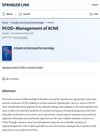
Acne in PCOS can be managed with specific treatment strategies.
 January 2024 in “International Journal of Dermatology Venereology and Leprosy Sciences”
January 2024 in “International Journal of Dermatology Venereology and Leprosy Sciences” Patients with acne vulgaris have lower serum irisin levels.
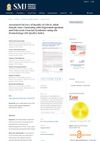 October 2023 in “Siriraj Medical Journal”
October 2023 in “Siriraj Medical Journal” Acne and hair loss in women can greatly lower their quality of life, but having polycystic ovarian syndrome does not.
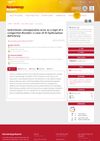 August 2023 in “Dermatology Reports”
August 2023 in “Dermatology Reports” Acne not improved by usual treatments may indicate a genetic disorder.
 June 2023 in “World Journal of Biology Pharmacy and Health Sciences”
June 2023 in “World Journal of Biology Pharmacy and Health Sciences” Acne is a common skin condition treated with creams, antibiotics, and emerging therapies, and it can significantly affect mental well-being.
 June 2023 in “Benha Journal of Applied Sciences”
June 2023 in “Benha Journal of Applied Sciences” Acne is caused by multiple types of bacteria.
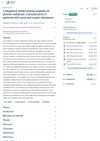 May 2023 in “Research Square (Research Square)”
May 2023 in “Research Square (Research Square)” Patients with acne and insulin resistance have different blood metabolites compared to those with only acne, which could help in diagnosis and treatment.

Women with acne and hair loss, even if they have regular periods, often have polycystic ovary syndrome.
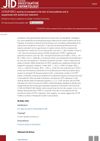 April 2023 in “Journal of Investigative Dermatology”
April 2023 in “Journal of Investigative Dermatology” Acne patients have higher skin mTORC1 activity, which is reduced by isotretinoin treatment.
 April 2023 in “Journal of Investigative Dermatology”
April 2023 in “Journal of Investigative Dermatology” Taking nicotinic acid supplements might help with acne by affecting the skin's oil glands, but high doses are needed.
 January 2023 in “Al-Azhar International Medical Journal /Al-Azhar International Medical Journal”
January 2023 in “Al-Azhar International Medical Journal /Al-Azhar International Medical Journal” Acne patients have higher mTOR gene expression.
 December 2022 in “Cureus”
December 2022 in “Cureus” Adult women with acne in Iraq often have more severe symptoms and hormone-related issues than younger girls with acne.
 November 2022 in “Journal of Investigative Dermatology”
November 2022 in “Journal of Investigative Dermatology” Acne is genetically linked to a higher risk of depression, anxiety, schizophrenia, and bipolar disorder, with the strongest link to bipolar disorder.
 June 2022 in “Journal of Education, Health and Sport”
June 2022 in “Journal of Education, Health and Sport” The paper reviews acne treatments for women with PCOS but doesn't give specific advice.
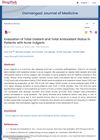 March 2022 in “Osmangazi tıp dergisi”
March 2022 in “Osmangazi tıp dergisi” Acne patients have higher levels of oxidative stress, but it's not clear if it causes or results from acne; antioxidants might help treat acne.
 July 2021 in “Journal of dermatology research and therapy”
July 2021 in “Journal of dermatology research and therapy” Using combined treatments can help manage acne by targeting the bacteria and skin changes that cause it.
 July 2021 in “Journal of emerging technologies and innovative research”
July 2021 in “Journal of emerging technologies and innovative research” Ayurvedic methods successfully treated severe acne in a patient.
 June 2021 in “International Journal of Research in Dermatology”
June 2021 in “International Journal of Research in Dermatology” Women with acne and PCOS should be checked for insulin resistance and related symptoms.
 April 2021 in “International Journal of Research in Dermatology”
April 2021 in “International Journal of Research in Dermatology” Most adult females with acne do not have hormonal imbalances, but some show signs of excess male hormones.
 December 2020 in “Benha Journal of Applied Sciences”
December 2020 in “Benha Journal of Applied Sciences” People with severe acne tend to have higher levels of betatrophin.

30% supramolecular salicylic acid is safe and effective for treating mild to moderate facial acne.
 April 2020 in “Journal of the Endocrine Society”
April 2020 in “Journal of the Endocrine Society” Non-classic congenital adrenal hyperplasia (NCCAH) can mimic PCOS and requires genetic testing for proper diagnosis and treatment.
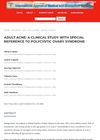 February 2020 in “International Journal of Medical and Biomedical Studies”
February 2020 in “International Journal of Medical and Biomedical Studies” Adult acne is often mild and common on the cheek, with a low prevalence of PCOS in female patients, but more severe acne and skin damage in those with PCOS.

Diet and supplements can significantly affect acne, with some foods and nutrients reducing and others worsening it.
 July 2019 in “Journal of case reports and scientific images”
July 2019 in “Journal of case reports and scientific images” A 23-year-old woman has Acne Vulgaris, which causes different types of skin bumps and possible scarring.
May 2019 in “Eurasian Journal of Biosciences” Fenugreek aqueous extract is more effective against acne bacteria than the alcoholic extract.
 January 2019 in “Obstetrics & Gynecology International Journal”
January 2019 in “Obstetrics & Gynecology International Journal” Hormonal changes and conditions like polycystic ovarian syndrome are major causes of adult acne in women, with varying prevalence among different ethnicities.
 January 2019 in “ARC journal of pharmaceutical sciences”
January 2019 in “ARC journal of pharmaceutical sciences” Acne can be managed with various treatments and requires psychological support due to its emotional impact.



























